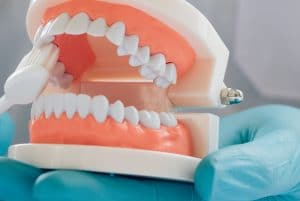 The fact that good dental hygiene is important to your oral health isn’t exactly a secret. However, many people can still experience the development of things like tooth decay and gum disease even when they diligently stick to the basics of good dental hygiene. For many people, the problem isn’t that their hygiene routine itself is ineffective, but rather that other things throughout the day often increase their risks to their oral health without them realizing it. Today, we take a look at a few of these factors, and how they can influence the overall results of your dental hygiene routine.
The fact that good dental hygiene is important to your oral health isn’t exactly a secret. However, many people can still experience the development of things like tooth decay and gum disease even when they diligently stick to the basics of good dental hygiene. For many people, the problem isn’t that their hygiene routine itself is ineffective, but rather that other things throughout the day often increase their risks to their oral health without them realizing it. Today, we take a look at a few of these factors, and how they can influence the overall results of your dental hygiene routine.
Keep existing oral bacteria in check
One of the biggest misconceptions about dental hygiene is that it begins and ends with brushing and flossing your teeth a couple of times every day. Sticking to a consistent brushing and flossing schedule is important to removing the bacteria that build up on your teeth throughout the day. However, oral bacteria accumulate on your teeth constantly, and when you’re not at the bathroom sink, controlling them means limiting how many nutrients they can metabolize. This means eating and snacking responsibly, without over exposing your teeth to harmful sugars. Whenever possible, clean or rinse your teeth with water after every snack and meal.
Time your hygiene schedule for maximum effect
Timing is everything when it comes to your dental health, including how you schedule your dental hygiene routine. For instance, brushing your teeth in the morning is especially important, as oral bacteria can gather excessively throughout the night as your saliva flow dries up. Also, be sure to brush and floss your teeth at night, preferably before going to bed, to minimize how many bacteria accumulate throughout the night.
Take any symptoms you develop seriously
Keeping your smile healthy on a consistent basis takes consistency in your dental hygiene and preventive routines. However, preventing bacteria buildup and poor hygiene habits from affecting your smile isn’t the only factor. When a problem with your oral health does develop, there are often symptoms to warn you of it, such as tooth sensitivity or redness and bleeding in your gums. These symptoms may be minor at first, but if you ignore them, the problem that causes them will have a chance to grow worse and lead to a need for more extensive dental treatment.
Learn how to improve your dental hygiene results
Your dental hygiene is the foundation of keeping your smile healthy, and optimizing the results of your routine is important to preserving your good oral health. To learn more, schedule an appointment by calling Gentle Smiles in Dallas, TX, today at 972-329-7645 (972-329-SMILE).






Recent Comments